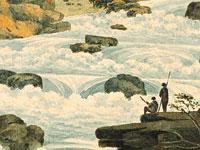
 This
view of the Grose River, probably close to its junction with Burralow Creek
(near presentday Grose Vale), is perhaps the earliest surviving depiction of a
Blue Mountains view. The eminence in the middle of this watercolour is probably
Paterson Hill.
This
view of the Grose River, probably close to its junction with Burralow Creek
(near presentday Grose Vale), is perhaps the earliest surviving depiction of a
Blue Mountains view. The eminence in the middle of this watercolour is probably
Paterson Hill.
George William Evans (1780–1852) had explored the area in 1804 and this painting
was possibly commissioned by the Lieutenant-Governor, William Paterson, who had
discovered and named the river in 1793. It is unusual in that it is an early
interpretation of a wild colonial landscape as a work of art, instead of a
literal record of a landscape. Few Australian images of natural landscapes have
survived from this period and this painting follows in the late
eighteenthcentury tradition of consciously artistic depictions of wilderness.
The two tiny Aboriginal figures (themselves representing the ‘wild’) in this
majestic setting underline a landscape unimproved by man.
Display item A view near Grose Head …, 1809
< Previous Exhibit | Back to The Exhibits page | Next Exhibit >